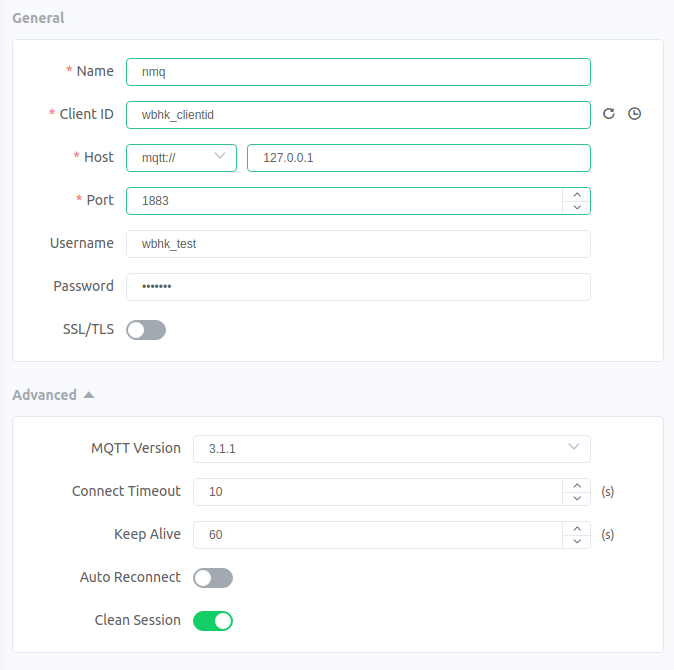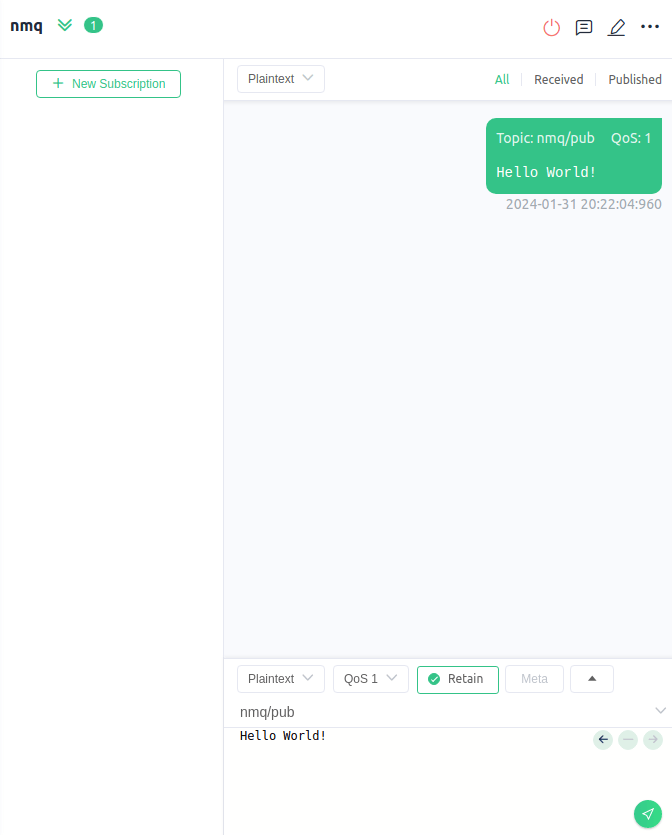WebHook Integration Tutorial
The WebHook feature in EMQX Edge enables the broker to automatically send HTTP POST requests to external services in response to specific MQTT events. These events include client connections, message publications, disconnections, and more. This mechanism makes it easy to integrate EMQX Edge with external systems such as logging services, analytics platforms, or custom dashboards, without writing custom plugins.
How It Works
When a specified event occurs, EMQX Edge composes an HTTP POST request with structured JSON data and sends it to a user-defined endpoint (url). You can configure one or more event rules under the webhook section in the configuration file.
Enable and Configure WebHook Integration
You can enable WebHook integration by adding the following snippet to your nanomq.conf. Refer to WebHook Configuration for more detailed configuration item explanations.
webhook {
url = "http://127.0.0.1:8888" # Destination endpoint for webhook requests
headers.content-type = "application/json" # Content-Type of the request
body.encoding = plain # Payload encoding: plain, base64, or base62
pool_size = 32 # Number of concurrent HTTP connections
events = [
{
event = "on_message_publish"
topic = "nmq/pub"
}
{
event = "on_client_connack"
}
{
event = "on_client_disconnected"
}
]
}Key parameters:
url: HTTP endpoint to receive WebHook calls.headers.content-type: Content-Type header for the payload (JSON recommended).body.encoding: Encoding of the payload (e.g.,plainorbase64).pool_size: Number of concurrent HTTP worker threads.events: List of event triggers;topicfilters can include wildcards (e.g.,nmq/#).
Event Rules
Webhook behavior is defined by specifying a set of rules, where each rule listens for a specific event (and optionally a topic). Each entry in the events array defines a WebHook rule. When an event occurs, EMQX Edge sends a structured HTTP POST request to a preconfigured URL.
Event Rule Fields
| Field | Type | Description |
|---|---|---|
event | string | The event type that will trigger the WebHook. Supported values: on_message_publish, on_client_connack, on_client_disconnected. |
topic | string | Optional. A topic filter that restricts triggering to specific MQTT topics (only applies to message-related events). |
Supported Events
The following built-in MQTT events can trigger WebHook:
| Event Name | Description | Trigger timing |
|---|---|---|
on_client_connack | Client connection acknowledgment | Triggered when a client completes the MQTT connection handshake and the server is ready to send CONNACT packet. |
on_client_disconnected | Client disconnects | Triggered when a client disconnects from the broker. |
on_message_publish | Message published | Triggered when a message is published to a configured topic. |
HTTP Request Format
When an event is triggered, EMQX Edge sends an HTTP POST request to the configured url. The request format is:
URL: <configured url> # From the url field in the configuration file
Method: POST # Fixed as POST method
Body: <JSON-formatted event data> # Body is a JSON format stringThe body for different events may differ. For example, a payload for the on_client_connack event might look like this:
{"proto_ver":4,"keepalive":60,"conn_ack":"success","username":"wbhk_test","clientid":"wbhk_clientid","action":"client_connack"}Each event type includes a specific payload schema:
on_client_connack
| Key | Type | Description |
|---|---|---|
| action | string | Event name Value: "client_connack", cannot be modified |
| clientid | string | Client ID |
| username | string | Client username (or "undefined" if absent) |
| keepalive | integer | Heartbeat keepalive time applied by the client |
| proto_ver | integer | MQTT protocol version (3 | 4 | 5) |
| conn_ack | string | "success" or reason for failure |
on_client_disconnected
| Key | Type | Description |
|---|---|---|
| action | string | Event name Value: "client_disconnected", cannot be modified |
| clientid | string | Client ID |
| username | string | Client username (or "undefined" if absent) |
| reason | string | Error reasons |
on_message_publish
| Key | Type | Description |
|---|---|---|
| action | string | Event name Value: "message_publish", cannot be modified |
| from_client_id | string | Publisher's client ID |
| from_username | string | Publisher's username (or "undefined" if absent) |
| topic | string | Topic name |
| qos | enum | QoS level (0, 1, or 2) |
| retain | bool | Whether it is a Retain message |
| payload | string | Message payload |
| ts | integer | Timestamp (second) |
Test the WebHook Integration
This section demonstrates how to verify that WebHook events are properly triggered in EMQX Edge.
Start EMQX Edge and a Test HTTP Server
For testing, you can use a simple HTTP server that prints incoming requests and responds with ok.
Start EMQX Edge with your configuration:
$ nanomq start --conf path/to/nanomq.confTIP
Ensure your HTTP server is running and listening on the URL specified in the webhook.url field of the configuration.
Trigger on_client_connack Event
Use the MQTTX Client Tool to connect to EMQX Edge. This triggers the on_client_connack event.
Sample connection setup in MQTTX:

Expected HTTP request received by the server:
header: content-type: [application/json]
Received: {"proto_ver":4,"keepalive":60,"conn_ack":"success","username":"wbhk_test","clientid":"wbhk_clientid","action":"client_connack"}Trigger on_message_publish Event
Next, publish a message to the topic nmq/pub:  Expected HTTP request:
Expected HTTP request:
header: content-type: [application/json]
Received: {"ts":1706703724960,"topic":"nmq/pub","retain":true,"qos":1,"action":"message_publish","from_username":"wbhk_test","from_client_id":"wbhk_clientid","payload":"Hello World!"}TIP
The topic field in your webhook event configuration supports MQTT wildcards. For example, setting topic = "nmq/#" will match all subtopics like nmq/pub1 or nmq/pub2.
Trigger on_client_disconnected Event
Disconnect the client to trigger the on_client_disconnected event.
Expected HTTP request:
header: content-type: [application/json]
Received: {"reason":"normal","username":"wbhk_test","clientid":"wbhk_clientid","action":"client_disconnected"}